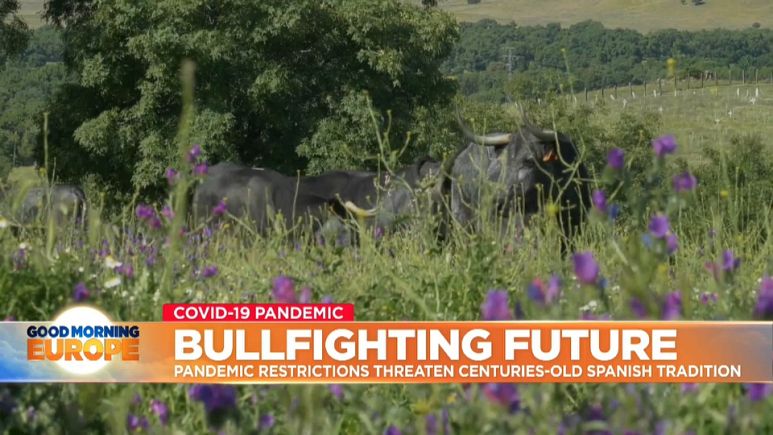Could COVID-19 spell the demise of Spain's bullfighting tradition?
euronews_icons_loading

The Coronavirus pandemic could lead to the collapse of bullfighting in Spain, as lockdown measures prevent the tradition from taking place.
The industry, which is worth 4.5 billion Euros to the Spanish economy, has been fighting for survival over recent decades, as many have turned away from the controversial tradition.
With Spain's leisure and tourism industry closed for business, bull breeders are fearing the worst. Fernando Guzman, a bull farmer who owns one hundred of the semi-wild breed used for fighting. He fears his livestock may be heading for the slaughterhouse if lockdown measures wipe out the remainder of the season.
There are now only 100,000 of this sub-species of bull left in the world. Guzman said: "The fighting bull is a breed that has always been semi-wild. They come from some of the first bulls that existed in Spain, that were captured by men. What defines them is their bravery."
Raised free-range, they play an important part in environmental conservation, according to Guzman. He said that the collapse of the bullfighting industry would have a far-reaching impact beyond the economic turbulence.
"The problems it will create are environmental, cultural, and economic. I think that now we are just about to see the tip of the iceberg and we are going to realize that it will be catastrophic."
Spanish political party, PACMA (Animalist Party Against Mistreatment of Animals) balks at these claims.
"Those who have been profiting from the breeding and exploitation of bulls to be tortured and executed in the so-called "festivities" cannot be the ones who intend to launch an order on morality to those who demand the prohibition of bullfighting, a violent activity, based on torture and exploitation of animals.
The reality that the bullfighting sector tries to hide is that the vast majority of these fighting bulls would also go to the slaughterhouse anyway. Only a percentage of them die in public. The rest are considered "waste", "defective" or forced to participate in the so-called popular "bullfighting" festivals that do not include the death of the animal in public, but whose destination always ends up being the slaughterhouse."
The cancellation of the Madrid bullfighting season will result in a loss of 400 million euros for the city. Open-air events are set to be permitted again soon, but with serious capacity restrictions.
Rafael García Garrido, Manager of Plaza de Las Ventas Arena fears that social distancing regulations will thwart business. "In a venue like this, with the capacity for 24,000 people, we will only be able to host a thousand. Bullfighting without spectators is nothing. When we come back we want it to be in a dignified way."
Some cities and regions in Spain, including Catalonia, have banned bullfighting festivals, known locally as “corridas”. In recent years, some festivals have attracted frequent demonstrations in protest of the practice.